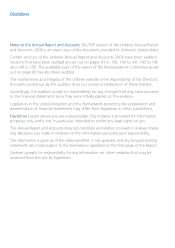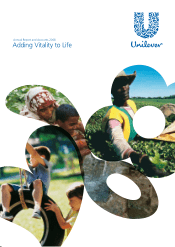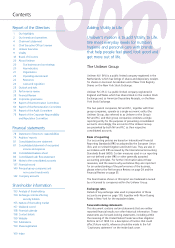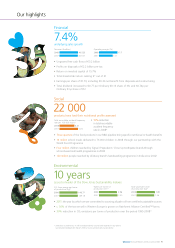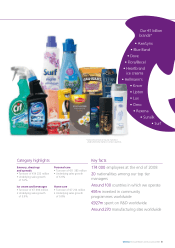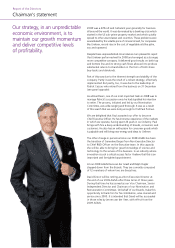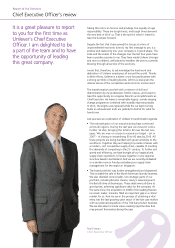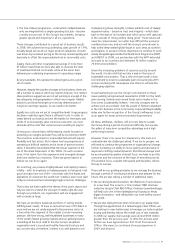Unilever 2008 Annual Report Download - page 10
Download and view the complete annual report
Please find page 10 of the 2008 Unilever annual report below. You can navigate through the pages in the report by either clicking on the pages listed below, or by using the keyword search tool below to find specific information within the annual report.
Underpinning these strengths, Unilever exhibits a set of deeply
ingrained values – based on trust and integrity – which date
back to the days of its founders and which are so well captured
in the concept of ‘doing well by doing good’. These values will
never be compromised, no matter how difficult the economic
conditions become, and nor will the Group’s commitment to
help tackle deep-seated global issues in such areas as nutrition
and hygiene. In pursuit of these objectives we continue to work
closely alongside agencies like the World Food Programme (WFP)
and UNICEF. In 2008, our partnership with the WFP extended
its scope to six countries and delivered 16 million meals to
76 000 schoolchildren.
Given the increasing problems of resource scarcity around
the world, it is also vital that we take a lead on the issue of
sustainable consumption. That is why we have made a clear
commitment to move to sustainable palm oil sourcing by 2015
and are working with Greenpeace and others to achieve this
challenging objective.
It was heartening to see the Group’s commitment to these
issues publicly recognised and rewarded in 2008. For the tenth
year running Unilever was named foods sector leader in the
Dow Jones Sustainability Indexes – the only company ever to
achieve such an accolade. And the award of Platinum standard
in the UK’s Business in the Community Corporate Responsibility
Index was further recognition of the Group’s willingness to act
as an agent for social and environmental improvement.
All these attributes, I believe, will not only help to sustain
the Group during a period of economic difficulty, but are also
the pillars of long-term competitive advantage and a high
performing business.
However,thereisnocauseforcomplacency.Wemustnot
underestimate the challenges ahead. If we are to prosper, we
will need to continue the programme of organisational change,
further increasing our ability to move quickly and decisively in
response to shifting market dynamics. But internal change must
be accompanied by greater external focus: we have to put the
consumer and the customer at the heart of everything we do.
This external focus, coupled with speed and discipline, will be
the key to success.
These will be our guiding principles as we manage the business
through a period of continuing turbulence and prepare for the
future. We are also taking a number of additional steps:
• Wearedrivingbrandinnovation,thelifebloodofourbusiness,
to a new level. The move to a ‘One Unilever’ R&D structure
under the Group’s Chief R&D Officer, Professor Geneviève Berger,
will help us to win in the marketplace by focusing on fewer,
bigger innovations – and rolling them out more swiftly around
the world.
• Wearealsoraisingthebarwhenitcomestooursupplychain.
Through the appointment of a Global Supply Chain Officer, we
are looking for even better ways to leverage our scale in global
buying and thereby reduce the overall cost of raw materials.
In2008oursupplychainsavingswerealmost€100million
greater than the previous year. To drive the process even
further we have appointed our first Chief Procurement
Officer. We expect a continued strong programme in
2009 and beyond.
• TheOneUnileverprogramme–underwhichmultiplebusiness
units are integrated into a single operating structure – became
a reality across most of the Group’s key markets, bringing
greater speed and simplicity to all our operations.
These changes contributed to a good set of business results
in 2008. We achieved strong underlying sales growth of 7.4%,
broadly based across all our major product categories. Growth
was driven by increased pricing as the Group moved quickly and
decisively to offset the unprecedented rise in commodity costs.
Supply chain and other organisational savings of more than
€1billionmeantthatwewerealsoabletoincreasethelevel
of investment behind our brands, while at the same time
delivering an underlying improvement in operating margin.
By any standards, this represents solid progress and a good
set of results.
However,despitethepositivechangestothebusiness,thereare
still a number of areas in which we need to improve. Our market
share positions suggest we are not yet winning in enough of the
keycategoriesandgeographiesinwhichwecompete.Market
positions and brand strength are two key determinants of
long-term earnings capacity. So we need to do better.
Equallyourcostsarenotyetatcompetitivelevels.Hugeprogress
has been made but again there is still work to do. In order to
invest behind our brands and win the battles for the hearts and
minds of an increasingly value conscious consumer, we must
eliminate all the costs that consumers are unwilling to pay for.
Growing our volume base, while keeping closely focused on
protecting our margins and cash flow, will be our priority in 2009.
The economic environment is unprecedented and will require
flexibility and fast action. But Unilever has long experience of
operating in difficult markets and at times of great economic
stress. It should be remembered that the Group was born in the
era of the Great Depression of the 1930s. On each occasion
since, it has learnt from the experience and emerged stronger
and more resilient as a business. There are good reasons to
believe we can do so again.
For one thing, we possess a highly relevant and inspiring mission.
Vitality – with its emphasis on helping people to feel good, look
good and get more out of life – resonates with the hopes and
aspirations of consumers the world over. Vitality is even more valid
today as consumers face increasingly tough economic challenges.
That is why we have made it the theme of this year’s report and
why we want to extend the concept of vitality right the way
through our products, our organisation and our engagement
with societies at large.
We have an excellent, balanced portfolio of strong brands
fulllingbasicneeds;13haveanannualturnoverof€1billionor
more and we are not overly exposed to the premium sector at
a time when this segment of the market is under increasing
pressure. We have strong, well-established businesses in many
of the world’s fastest growing markets and our global presence
is building all the time. Add to this the Group’s simplified
organisation and a sound and healthy financial structure and
you can see why, we believe, Unilever is so well placed to win.
Unilever Annual Report and Accounts 2008 7

